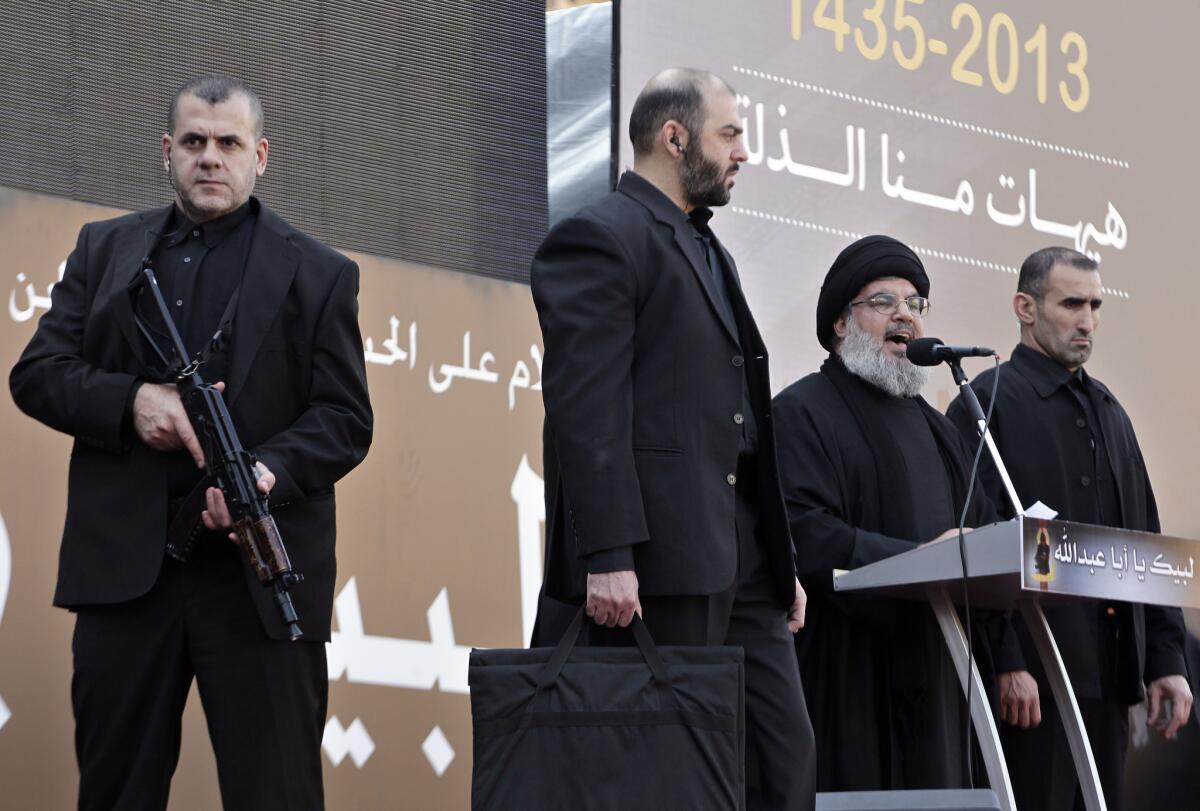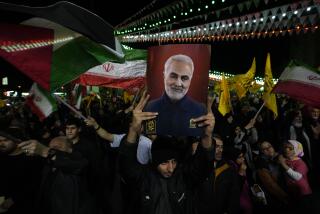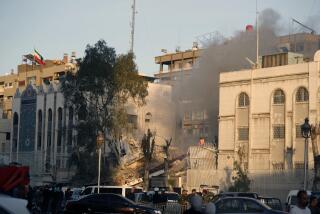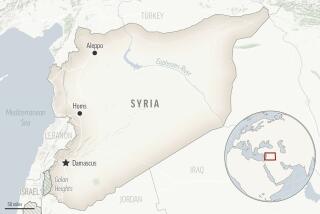Hezbollah leader Nasrallah vows to keep forces in Syria

BEIRUT — Hezbollah forces will remain in Syria fighting alongside the troops of Syrian President Bashar Assad for the foreseeable future, the leader of the Lebanese group said Thursday.
“As long as the reasons are present, we are staying” in Syria, Hassan Nasrallah, Hezbollah’s general secretary, said in a speech to supporters here marking the Shiite Muslim holiday of Ashura.
Hezbollah rejects any suggestion that it pull out of Syria as a “precondition” for forming a government in Lebanon, where a caretaker administration rules amid deep political divisions aggravated by the conflict next door in Syria. Rival Lebanese factions and Syrian opposition activists have demanded that Hezbollah militiamen vacate Syria, a proposal that Nasrallah definitely nixxed.
“Anyone who puts Hezbollah’s withdrawal from Syria as a precondition for forming a government is putting a hopeless condition,” Nasrallah said, flanked by bodyguards in his second public appearance in two days.
Because of security concerns, Nasrallah typically makes his speeches via video links from undisclosed sites. But the live appearances may have been meant as a message of improved security in southern Beirut, a generally pro-Hezbollah district that was hit by a pair of car bombs in July and August. Nasrallah has blamed militants based in Syria for the attacks.
Hezbollah is both a dominant political player in Lebanon and an armed militia whose forces are widely considered superior to those of the Lebanese military. The United States and Israel label Hezbollah a terrorist organization, but the group calls itself a resistance front against Israeli and U.S. aggression. Its key allies are Iran and Syria’s Assad.
The assertion that Hezbollah would retain its armed presence in Syria came as no surprise. The group has not budged on its determination to assist Assad’s government against what it deems a “terrorist” threat that could also pose a danger to Lebanon. Hezbollah militiamen were key in helping Syrian forces regain control in June of the central Syrian city of Qusair, close to the Lebanese border, in a major strategic victory.
Hezbollah is a secretive organization, and it is not clear how many of its militiamen are in Syria or where, beyond a Hezbollah contingent protecting Sayyida Zainab, an important Shiite shrine southeast of Damascus. Nasrallah has said that Hezbollah’s foes exaggerate its s presence in Syria. Iran denies having any fighting forces in Syria.
The Syrian conflict has fanned sectarian tension throughout the Middle East, drawing fighters from Islam’s two major branches to opposite sides of the battle front.
While Shiite Hezbollah has dispatched militiamen to aid the Assad government, thousands of Sunni Muslim militants from across the globe have journeyed to Syria and taken up arms against Assad, a member of the Alawite sect, considered an offshoot of Shiite Islam. Several affiliates of Al Qaeda, a Sunni group, are major powers in the disparate Syrian rebel movement.
Persian Gulf states and Turkey, with Sunni Muslims majorities, are key backers of the rebels. Shiite Iran, meanwhile, is a major supporter of Assad’s government.
In Syria, the government has touted military advances in recent days south of Damascus, the capital, and near the northern city of Aleppo, which has been divided among rebel and loyalist forces for more than a year. U.S. and Russian officials have expressed hope that peace talks known as Geneva II will take place next month, but no date has been announced.
This week, the main U.S.-backed opposition umbrella group, the Syrian National Coalition, reiterated its stand that any talks would have to lead to Assad’s departure from power, a condition that the government has repeatedly rejected.
On Thursday, Syrian Information Minister Omran Zoubi derided as “ridiculous and politically trivial” opposition representatives “who dream that they would go to Geneva to take Damascus’ keys.”
The Syrian conflict, now in its third year, has been devastating, resulting in the deaths of more 100,000 people, reducing many areas to rubble and exporting refugees and political instability to Lebanon and other neighboring nations.
ALSO:
Battle against corruption failing across Africa, survey finds
‘Nervous’ mafia could target Pope Francis, prosecutor warns
U.S. aircraft carrier arrives in Philippines for typhoon relief effort
Twitter: @mcdneville
Special correspondent Nabih Bulos in Philadelphia contributed.
More to Read
Start your day right
Sign up for Essential California for news, features and recommendations from the L.A. Times and beyond in your inbox six days a week.
You may occasionally receive promotional content from the Los Angeles Times.






